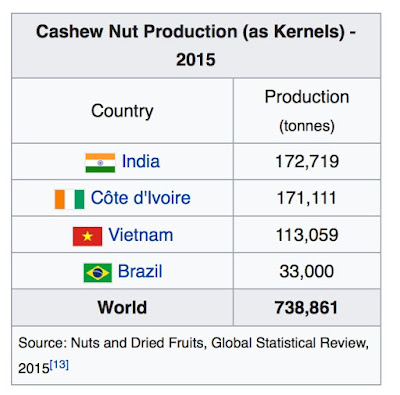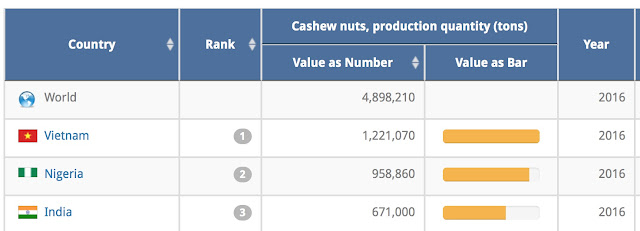Hello World,
While I am preparing my next vomit on Arthashastra, I went through the 2018 Budget documents and I have an observation to share with you. Let’s get started.
We will begin with an exhibit:
The 2018-Budget proposes to reduce the customs duty for the import of cashew nuts by 50%. What used to be 5% is going to become 2.5%. Cashew is high value crop and 50% slash is a significant gain and this is expected to make the import of cashew from international markets into our country much cheaper than what it used to be.
Usually, when two countries agree to help each other economically, they ease the selling of each others’ products and services in their respective territories. Also, when the nation needs a raw material for a specific product which also has to be affordable to the citizens, the administration usually relaxes the import duties and enables the market players to take advantage of the margins.
In an effort to understand the story behind I googled to find who the top producers of cashew nuts are.
Fun fact: We are one of the top-3 producers!
Here’s a set of screenshots to indicate that:
I started wondering why cashew imports need to be relaxed in a country which is already in the top-3 producers list. The reasons are simple:
If cashew imports are relaxed:
- The local producers will have to face international competition and might not necessarily win the price war.
- The local farming economy will face the brunt given that they are already producing the some of the major quantities, globally.
I wanted to know how big the local cashew farming economy existed and I landed at this:
So, 5 out of 7 states in the Top-6 Cashew Producers List are Telangana, Andhra Pradesh, Tamilnadu, Kerala and Karnataka. The others marked as top producers are West Bengal, Jharkand and Maharashtra.
If I look closely, most of these states have political rhetoric strongly criticising the current central administration and the political party that is running it. In essence, what I see is an economic war being waged against states who are not willing to collaborate with the political party running the central administration right now.
I might be wrong but here’s my set of questions:
Why is that cashew is the only agri-produce whose import duty is slashed by 50%?
How come the crop which comes from select states with a similar political rhetoric can be imported for cheap?
Is this an economic war against the farmers of the regions where political ideologies don’t necessarily match with that of the current central administration?
While I pondered this, scrolling through the budget document, I came across this:
National program from the central budget aiming at air pollution is something that needs to be lauded with a open heart. Such programs make the place a bit better for future generations. In this case the program directly aims at reducing the loss to the agricultural-economy as a result of air pollution.
However, why do such ambitious programs exclusively cover select states from the country?
This to me means that, the air-pollution-driven death and health hazards faced by citizens from the other states of this country is perfectly ok.
The priority is just those states which face the MOST POLLUTION. You see, pollution is not bad. MOST POLLUTION is alone bad. Only those who face MOST POLLUTION are superior humans and deserving citizens for a centre-driven program. This is how the best brains work in this country as of now and I cannot imagine of an award that I can recommend the brains who voted these neuro-superior-homo-sapiens who are deeply passionate about protecting just those superior humans who face the MOST POLLUTION in this country.
For some reason, the states who stand to face the economic brunt of cashew imports do not match or even come close to the states included in the air pollution program.
So some states can have cleaner air and no competition from foreign agri products while others can breathe more monoxides and eat unsold cashews until death.
The reality might be something very different from the grim picture I paint here.
The questions are:
Is it, really?
At What point do we admit the fact as a fact?
Best regards,





